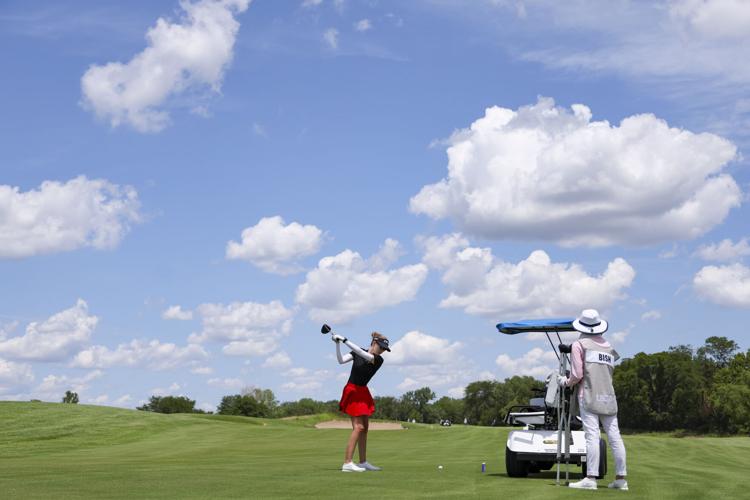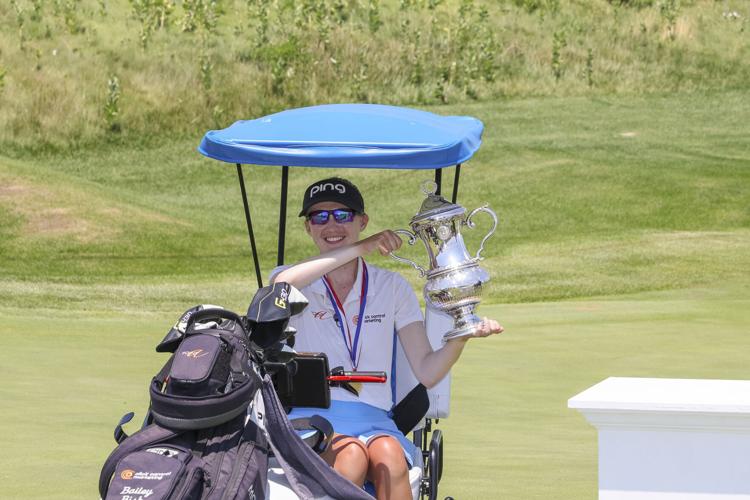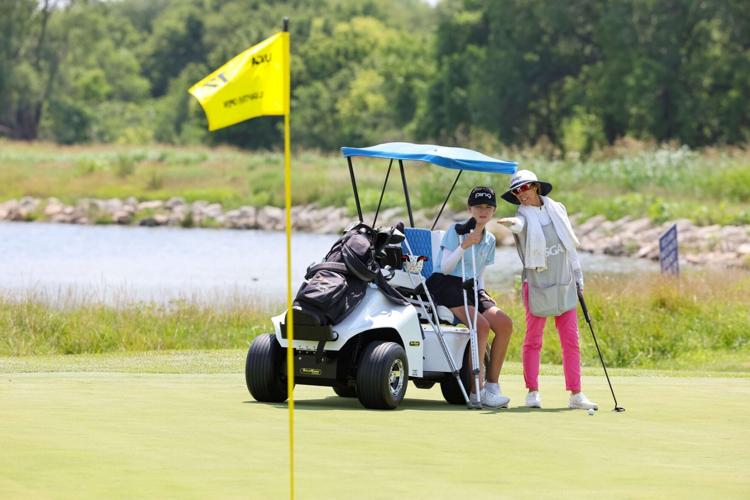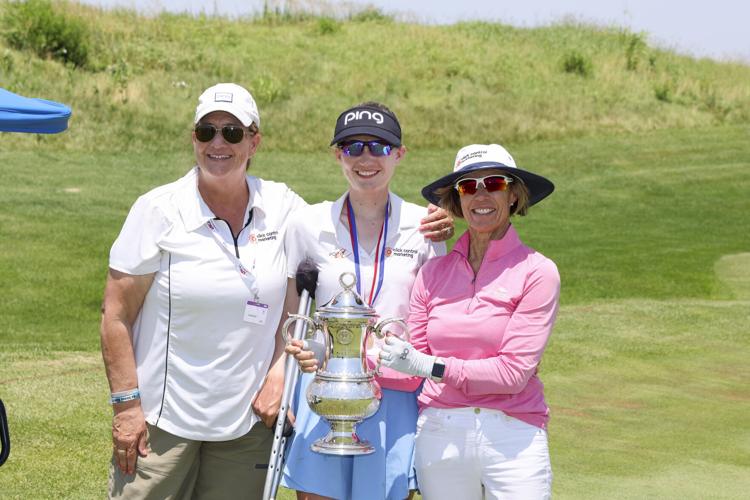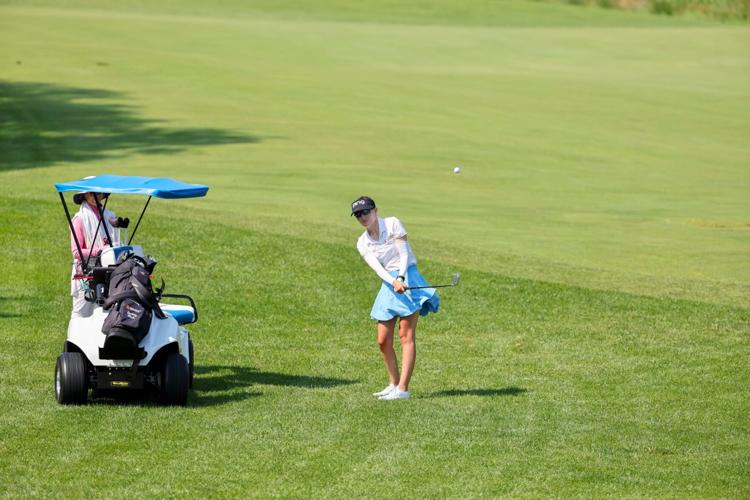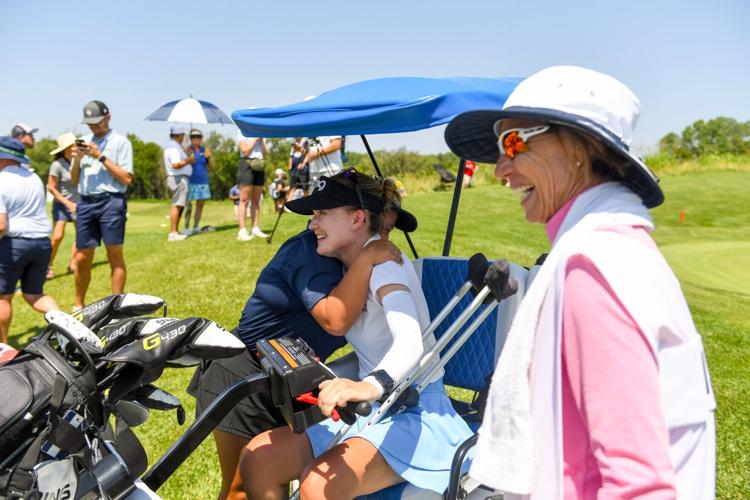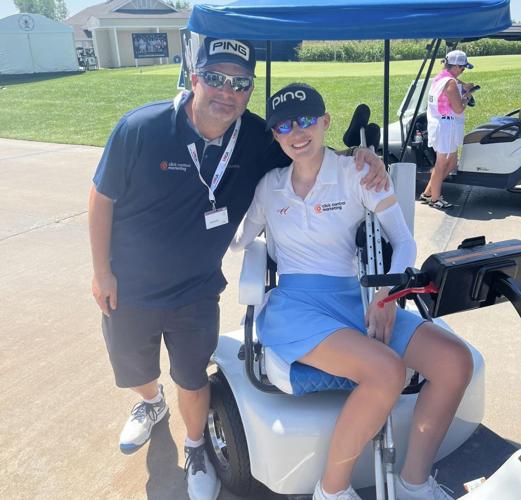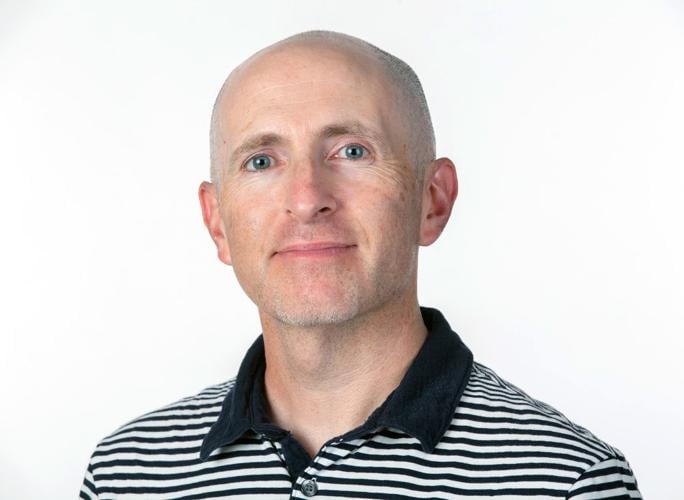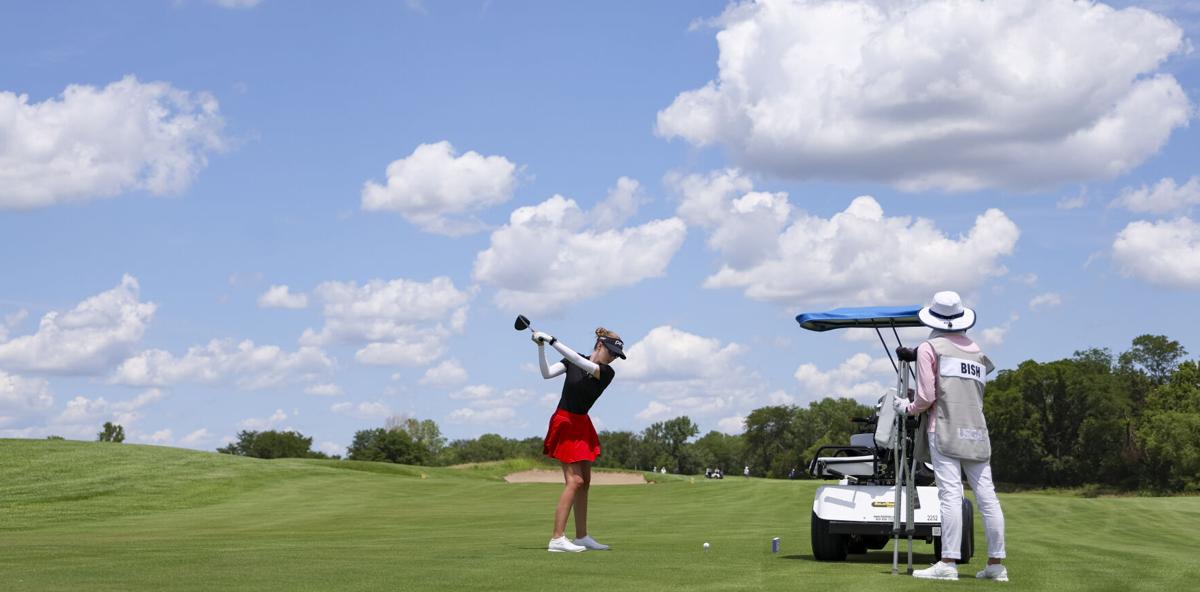Three years ago, Bailey Bish barely could complete nine holes of golf.
Six weeks ago, the Tucsonan won the 54-hole U.S. Adaptive Open.
How’s that for a how it started/how it’s going?
The challenges Bish, a 24-year-old graduate of Tanque Verde High School and Pima Community College, faces every day would crush a lesser person.

Michael Lev is a senior writer/columnist for the Arizona Daily Star, Tucson.com and The Wildcaster.
It’s hard to comprehend and contextualize everything she endures on a daily basis — never mind playing golf at a championship level. But we’re going to try.
Difficult-to-control muscle spasms, frequent fainting, erratic vision ... it’s a lot. Bish wouldn’t let any of it break her. She had goals to achieve. Still does.
Winning the U.S. Adaptive Open is one she can check off the list. The national golf championship for players with disabilities has been around for three years. Competing in the Neurological Impairment category, Bish qualified for the first time last year and finished third. She won it this year, going wire to wire, from July 8-10 at Sand Creek Station in Newton, Kansas.

Tucson’s Bailey Bish holds her trophy for photos after the final round of the 2024 U.S. Adaptive Open at Sand Creek Station in Newton, Kansas, on July 10.
“We’re just so proud of all the hard work and determination that she put in,” said Helena Bish, Bailey’s mother. “What she had to go through to achieve this goal and the physical challenges she had to overcome.”
Helena would know. She’s been at Bailey’s side for every step — even if, at times, it’s been one forward and two back.
Bailey will be the first to tell you that she couldn’t have done this alone. It takes a village to raise a champion.
She had the support of her family, with her mom leading the way; the perfect coach for her particular situation in Susie Meyers; an unfailingly generous sponsor in Michigan businessman Walt Conger; plus doctors and physical therapists and, well, too many to list here.
In a divisive time that often brings out the worst in people, the Bishes have seen and felt humanity’s better side.
“We’ve met a lot of good people along this journey,” Bailey Bish said. “Bad things happen, but there are a lot of good people out there.”
“So many beautiful things have come out of adaptive golf,” her mother said. “We’ve been exposed to so many people who are kind and generous and want to help.
“You wouldn’t know there’s so much good out there, but there is.”
Sometimes, Bailey Bish would fall down along her journey. But she’d always get back up. Often, she’d need help. And that’s OK.
Seeking answers
Bailey Bish’s health took a turn for the worse when she was 14 years old.
A good athlete who played varsity basketball as a freshman at Tanque Verde High, Bish had a variety of issues. Sometimes, her jaw would dislocate when she was running down the court. She had chronic sinus infections.
“I’d been sick my whole life with several conditions,” Bish said. “Just a lot of tight muscles that nobody could really explain.”

Tucson’s Bailey Bish, center, her mom, Helena, left, and her caddie, Susie Meyers, pose for a photo with the trophy after the final round of the 2024 U.S. Adaptive Open at Sand Creek Station in Newton, Kansas, on July 10.
She had surgery to try to alleviate the sinus problems, and she ended up getting sick. She had a fever that spiked at 105.7 degrees.
“The virus just kind of set everything off,” Helena Bish said.
Bailey eventually was diagnosed with dystonia, a disorder that causes involuntary muscle contractions and affects about 250,000 people in the U.S. In Bailey’s case, it impacted the right side of her body.
“After she quit shaking (from the fever), her right leg wouldn’t move,” Helena Bish said. “Once we got it moving, it didn’t have any dimmer switch.
“The dystonia became uncontrollable. We just kept trying to find answers and get treatment that would at least help control the symptoms.”
Bailey also suffered from postural orthostatic tachycardia syndrome, or POTS. She couldn’t sit up for 30 minutes without passing out.
Needless to say, these issues made it difficult to play sports.
“After a lot of hard work and PT (physical therapy), I got back to kind of playing basketball my sophomore year,” Bailey Bish said. “It was never normal. My arm would start spasming really bad.”
By the end of her senior year, Bailey “basically became wheelchair-bound and bedridden,” her mother said. “It was a dark period in her life.”
Bailey had to take classes online to get her diploma. Helena had to quit her job as a medical billing advocate to take care of her daughter and take her to appointments.
(John Bish, Helena’s husband and Bailey’s father, continues to work as a storage solutions architect. Their younger daughter, Kristen, suffers from similar ailments as her sister.)
The Bishes were desperate for solutions — anything that would make Bailey’s life easier. She made progress working with Catherine Printz, a physical therapist who specialized in patients with neurological disorders such as Parkinson’s disease.

Tucson’s Bailey Bish, left, plays a shot on the eighth hole as caddie Susie Meyers looks on during the first round of the 2024 U.S. Adaptive Open at Sand Creek Station in Newton, Kansas, on July 8.
Printz suggested that Bish start receiving Botox injections. Botox has proved to be effective in the treatment of neurological disorders, weakening the muscles that spasm and allowing the opposing muscles to work properly.
Bish was hesitant to try it, she said, because she “had a lot of medical procedures that did not go well.” Printz took time off work to accompany Bish to her first appointment. We said it takes a village, right?
The Botox treatments were a “game-changer,” Bish said. “They allowed me to gain strength and function over time.”
Another game-changer: Bish began wearing a device called a vagus nerve stimulator, which sends electrical impulses to her brain. That mitigated the effects of POTS.
“It was hard to go through all of that,” Bish said. “I wanted to get my life back. Once we found out exactly what I had — and people who could help me get my life back on track — I got into a better place and started feeling some hope.”

Tucson’s Bailey Bish, left, talks with her caddie, Susie Meyers, on the 17th hole during the second round of the 2024 U.S. Adaptive Open at Sand Creek Station in Newton, Kansas. on July 9.
Bish still needed something that would give her a sense of purpose. She found it on the golf course.
‘One determined girl’
Despite living near Forty Niner Country Club, the Bishes weren’t a golfing family. With her jaw hurting and other issues cropping up, Bailey Bish wanted to try a noncontact sport. She began taking lessons.
“Two months after she started is when everything went wrong,” Helena Bish said, referring to Bailey’s sinus surgery and its side effects.
Helena didn’t know Susie Meyers but knew of her and reached out with a simple request regarding Bailey: Can you help her?
If anyone could, it was Meyers. Not only was the University of Arizona product a former LPGA Tour player and elite instructor, she also wrote a book called “Golf from Point A.” Its overarching theme: Playing one shot at a time and “doing the best you can with what you have right where you are,” Meyers said.

Tucson's Bailey Bish gets a hug from fourth-place finisher Amanda Cunha as Bish's caddie, Susie Meyers, smiles on 18th hole during the final round of the 2024 U.S. Adaptive Open at Sand Creek Station in Newton, Kansas, on July 10.
When Meyers first met her, Bailey barely could walk or use her right hand. Meyers was undeterred.
“That’s what I do — I help people,” she said. “I don’t really teach golf. I try to help people reach what they want to reach.”
At first, Bish “had no feel of where her clubface was,” Meyers said. “But she was super athletic. When she made contact, the ball would fly 200 yards. It was amazing.
“At the beginning, we went through a lot of different physical challenges. There were so many different things about her body. You never knew what you were going to get. But this was one determined girl, and she never gave up.”
Bish can’t walk the course or carry a golf bag. She gets around in a SoloRider cart. She has to swing flat-footed because if she uses her right side too much — torquing her back leg — she’s liable to seize up.
Bish drives the SoloRider as close as she can to her ball. Her caddie — either her mom or, for big events like the U.S. Adaptive Open, Meyers — hands her crutches. She uses them to position herself over the ball. She then swaps them for a club.
Whoever’s caddying for Bish also helps her to get properly aligned and to determine what type of shot to hit. She suffers from convergence insufficiency, a vision disorder that makes it hard to focus, especially up close. “Where I think things are and where they actually are is sometimes off,” she said. Bish counteracts that issue by wearing goggles that look like 3D glasses.
Whether it’s her mom or Meyers on the bag, they help Bish visualize shots by painting a mental picture. Meyers described a meticulous process of reading greens for Bish, pacing off the distance and detailing the slope and break.
Considering everything that’s involved in hitting a single shot, you might wonder why Bish puts herself through so much. It’s pretty basic, really: She’s an athlete.
“Having a sport to focus on is very essential to me being happy,” Bish said.

Tucson's Bailey Bish plays a shot to the ninth green during the final round of the 2024 U.S. Adaptive Open at Sand Creek Station in Newton, Kansas, on July 10.
Said Meyers: “Every human being needs a sense of purpose, needs to have a dream, feel that they’re doing something — self-improvement or serving others. Everyone needs to feel they have value in life. We have to find that from within.
“When the announcer (at the U.S. Adaptive Open) said Bailey’s smile lit up the tournament all week long, that’s Bailey. She rolls her wheelchair into a room, everybody loves her. She is not bitter. She is not so competitive that she doesn’t notice other people. She’s a beautiful person.
“She’s living her life the best she can.”
Sponsorship, championship
Walt Conger first met Bailey Bish at the National Amputee Golf Association Open Championship in 2021.
Conger is the founder and CEO of Click Control Marketing, a digital marketing agency in Grand Blanc, Michigan. A friend who’s an adaptive golfer told him about the event in Las Vegas. Intrigued, Conger decided to participate in the tournament along with his son, Gabe. Click Control Marketing also would become one of its sponsors.

Walt Conger, founder and CEO of Click Control Marketing, poses with Tucson's Bailey Bish at the 2024 U.S. Adaptive Open in Newton, Kansas. Conger's company sponsors Bish, providing the family with much-needed financial support.
The Congers played a round with Bish, or at least part of one. She could only play nine holes back then, and even that was a struggle.
Conger noticed how determined Bish was and how she carried herself. He found her to be humble and appreciative while playing a game that can frustrate the best golfers in the world — none of whom face the physical challenges that Bish does every day. Conger described that experience as “life-changing.”
Conger sat with the Bishes at an awards ceremony, struck up a conversation and told them he wanted to aid Bailey in her journey. Starting in 2022, Click Control Management became her sponsor, helping the family offset the costs of traveling to out-of-town tournaments.
“I wanted our company to be involved in something special,” Conger said. “It all just jumped out at me. It was something I needed to do.
“We honestly did it with no expectations in return. Three years later, she’s on the Golf Channel getting interviewed, wearing our logo.”

Tucson’s Bailey Bish holds up her trophy during the prize ceremony after the final round of the 2024 U.S. Adaptive Open at Sand Creek Station in Newton, Kansas, on July 10.
Bailey Bish had big aspirations. Conger’s support emboldened her while also easing her family’s financial burden.
“I’m just extremely thankful,” she said. “He doesn’t have to do any of this. I don’t have a huge platform. For him to invest in me when I can’t guarantee any returns was huge. It made me feel like I’m as good as other athletes who aren’t disabled.”
Bish had to improve her endurance to compete in national tournaments such as the U.S. Adaptive Open. It was a gradual, painstaking process — one she essentially took one hole at a time. Thanks to better medical treatment, regular physical therapy and sheer force of will — “I think it mostly comes from her big heart,” Meyers said — Bish built herself up. From six holes to seven to nine to 12 to 15 to 18.
She first played 18 holes on back-to-back-to-back days at Forty Niner Country Club in January 2023. Later that year, she won the USA Disabled Golf Association Championship. In her first U.S. Adaptive Open, at Pinehurst No. 6, she finished third.

Bailey Bish watches as her name is engraved onto her trophy after the final round of the 2024 U.S. Adaptive Open at Sand Creek Station in Newton, Kansas, on July 10.
Bish opened this year’s tournament with a career-best 69. After shooting a 78 in Round 2, she began the third and final round with two bogeys and a double-bogey. She responded with her first career eagle on the fourth hole and a birdie two holes later. She parred the final eight holes to win by four strokes.
Bish didn’t fall down once. She had to pick herself up a bunch, but only in the metaphorical sense.
Bish’s performance brought her team to tears. Bailey didn’t cry, though.
“I was so ecstatic and filled with joy,” she said. “My family sacrificed a lot. To have it all pay off with a win was just incredible.”
Her name now appears on the same plaque in the USGA’s Hall of Champions as Tiger Woods and Annika Sorenstam. But Bish isn’t satisfied.
“I would love to repeat,” she said.
In the meantime, she helps run adaptive golf clinics at the Randolph Golf Complex. She knows, better than most, that a little encouragement can go a long way.
“Golf has made a big difference in my life. I wanted to share the game with other people who maybe never thought golf would be a game for them,” Bish said.
“It’s not just a game for able-bodied people. It’s a game for everyone.”


